Book contents
- Frontmatter
- CONTENTS
- List of Contributors
- List of Figures and Tables
- Introduction: Philosophy's Relevance in Computing and Information Science
- Part I Philosophy of Computing and Information
- Part II Complexity and System Theory
- Part III Ontology
- Part IV Knowledge Representation
- Part V Action Theory
- 13 Knowledge and Action between Abstraction and Concretion
- 14 Action-Directing Construction of Reality in Product Creation Using Social Software: Employing Philosophy to Solve Real-World Problems
- 15 An Action-Theory-Based Treatment of Temporal Individuals
- 16 Four Rules for Classifying Social Entities
- Part VI Info-Computationalism
- Part VII Ethics
- Notes
- Index
15 - An Action-Theory-Based Treatment of Temporal Individuals
from Part V - Action Theory
- Frontmatter
- CONTENTS
- List of Contributors
- List of Figures and Tables
- Introduction: Philosophy's Relevance in Computing and Information Science
- Part I Philosophy of Computing and Information
- Part II Complexity and System Theory
- Part III Ontology
- Part IV Knowledge Representation
- Part V Action Theory
- 13 Knowledge and Action between Abstraction and Concretion
- 14 Action-Directing Construction of Reality in Product Creation Using Social Software: Employing Philosophy to Solve Real-World Problems
- 15 An Action-Theory-Based Treatment of Temporal Individuals
- 16 Four Rules for Classifying Social Entities
- Part VI Info-Computationalism
- Part VII Ethics
- Notes
- Index
Summary
Introduction
In this essay, I illustrate the relevance of basic philosophical research in information science by means of an example, where I present research on the semantic representation and model-theoretic evaluation of temporal individuals. While common ontologies underlying the computational treatment of temporal individuals are geared to the surface of natural language descriptions, I propose to model temporal individuals by a constitutional ontology of distinctions among temporal variations based on the type of explanation which is used for the segmentation, identification and consequent representation of the respective temporal entity. With respect to explanations of temporal variation, recent investigations in action theory propose a threefold distinction between causal, behavioural and intentional explanation. I adopt this to enrich the representational formalism of discourse representation theory (DRT) with operators that specify how temporal processes are related to representations by means of explanatory identification of temporal individuals.
The Traditional Approach
Traditional approaches to temporal individuals usually follow Donald Davidson's logical analysis of action sentences, where he proposed to capture the logical properties of natural language descriptions of actions with the introduction of a new class of ontological entity besides individuals; events, where events are supposed to be ‘entities in the world with their own observer-independent grounds of existence’. The following example illustrates Davidson's approach to the logical form of predicates that refer to actions.
- Type
- Chapter
- Information
- Philosophy, Computing and Information Science , pp. 179 - 188Publisher: Pickering & ChattoFirst published in: 2014

